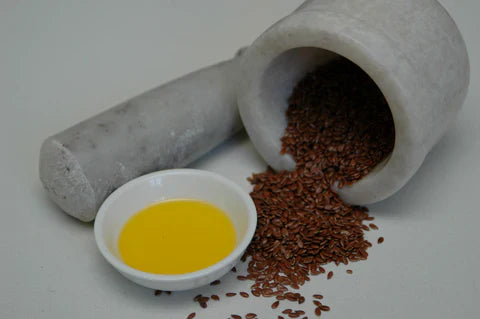Whole Flax Seeds vs Flax Seed Oil

Whole flaxseed as a ‘wholefood’
Whole flaxseeds (linseeds) are classed as a wholefood, as they offer protein, carbohydrates, healthy fats, minerals and vitamins, and in this respect they offer a nutritional advantage over flax seed oil. Each 15g serving of ground flaxseed contains 4.7 grams of dietary fibre, an important carbohydrate that is so important for gut health, cardiovascular health, and reduced cholesterol levels. This same 15g serving also provides 3.4g of plant protein, 3.8g of essential ALA omega 3 fatty acids, and a whole array of vitamins and minerals (see below). Flaxseed also offers a nutritional leg up on flax seed oil because of its lignan content. A family of phytonutrients, lignans have a molecular structure similar to that of human oestrogen and could help to regulate oestrogen signalling in your body. Pressing flax seed oil separates the lignans from the fats in flaxseed, so only flaxseed -- not flaxseed oil -- boosts your lignan intake.9.78mg of phosphorous, needed for the body to make protein for the growth, maintenance and repair of cells and tissues, and for the formation of bones and teeth.
5.6mg of magnesium, to help maintain normal nerve and muscle function, support a healthy immune system, keep the heartbeat steady and help bones remain strong. Magnesium also helps to adjust blood glucose levels, and aids production of energy and protein.
11.9mg of potassium, one of the most important minerals in the body. It helps regulate fluid balance, muscle contractions and nerve signals. A high-potassium diet may help reduce blood pressure and water retention, protect against stroke and prevent osteoporosis and kidney stones.
3.38mg of calcium, to maintain strong bones. Almost all calcium is stored in bones and teeth, where it supports their structure and hardness. The body also needs calcium for muscles to move and for nerves to carry messages between the brain and every body part. Calcium also helps release hormones and enzymes that affect almost every function in the human body.
Flax seed oil – your ‘omega 3’ powerhouse
The major advantage of flax seed oil over ground flaxseeds is that the oil provides much more ‘essential’ fatty acids per serving – ‘essential’ as the body cannot make these healthy fatty acids so they need to be incorporated into the diet. Flax seed oil is particularly rich in omega 3 (in the form of Alpha Linolenic Acid), with a massive 60% in Totally Kiwi’s flax seed oils! Omega 3 is particularly important for vegetarians and vegans, who need to get this vital nutrient from plant sources rather than oily fish. An omega 3-rich diet can maintain heart health, promote a healthy digestive system, help alleviate inflammatory disorders and skin conditions, and may aid in brain function. Just 1 tablespoon (14ml/14g) of flax seed oil provides 8.5 grams of omega 3 essential fatty acid.
To sum up
If you’re needing extra protein, dietary fibre, vitamins, minerals or lignans (think menopause!) then those nutrients are specific to the seeds. Remember to always grind the whole seeds to ensure that you digest the goodness inside!
For healthy, essential omegas, in particular omega 3 (listen up all veg~ns!), then opt for the oil.
For maximum benefit, combine ground seeds with high-quality flax oil. You can put them both in a smoothie or use them separately, whatever works for you.
A word on freshness
We recommend that you buy your flaxseeds whole and then grind them yourself immediately before use. That way, the fatty acid chains won’t have a chance to oxidize and go rancid.Flax seed oil must be sourced carefully. Seed oils, if they are not cold pressed and bottled with care, can go rancid very quickly. The more omegas in the oil, the more easily the oil can go rancid. Totally Kiwi flax seed oil is cold pressed in small batches at our facility in Ashburton and bottled with love and care in glass to ensure quality and freshness. We recommend storing your flax seed oil in the fridge to keep it tasting yummy for longer.

